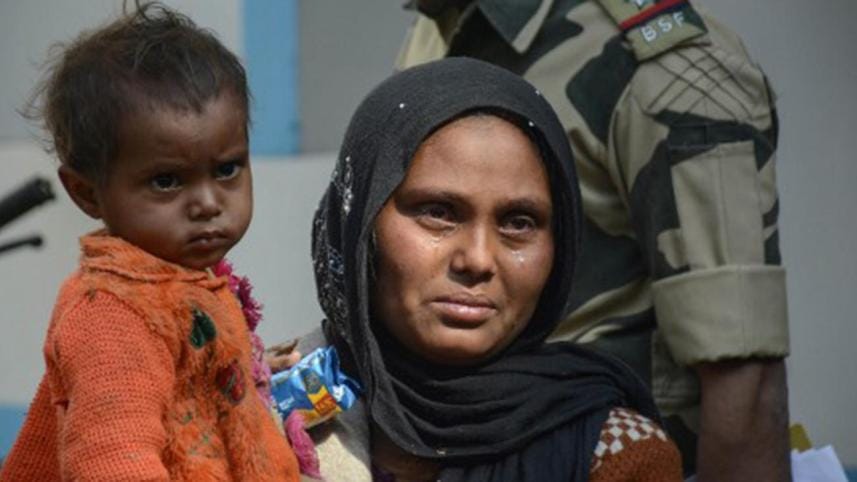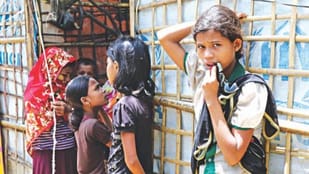Bangladesh ‘outraged’ by Myanmar’s fabrication of facts at UNGA

Bangladesh is "outraged" to witness another "blatant demonstration of falsehood and fabrication of facts" by Myanmar at the ongoing UN General Assembly (UNGA) and informed the international community of the situation on the ground.
"Bangladesh strongly rejects baseless accusations and falsification and misrepresentation of facts that Myanmar made in the UNGA," a senior official in Dhaka told UNB conveying what Bangladesh exactly responded to Myanmar's propaganda.
Also read: Myanmar guilty, Bangladesh victim
Bangladesh, through the UN, has urged the Myanmar government to abandon its policy of lies and propaganda and demonstrate genuine political will to take back their own nationals with safety, security and dignity, said the official.
Myanmar at the UNGA claimed that Bangladesh is harbouring terrorists in Cox's Bazar Rohingya camps but it rejected such "baseless" allegations.
Bangladesh, under the leadership of Prime Minister Sheikh Hasina, maintains a zero-tolerance policy to terrorism, terror financing and other drivers of terrorism, said another official.
"We don't allow our territory to be used by any terrorist. Myanmar needs to look at its own mirror," the official said, mentioning that this is what Bangladesh's reply to Myanmar was during the general debate at the UNGA.
Bangladesh also pointed out "concocted and misleading" statement of Myanmar on the development in Rakhine State,particularly in the repatriation process.

NOT A BILATERAL ISSUE
Myanmar's Minister Kyaw Tint Swe, in his speech at the UNGA, on Tuesday said bilateral cooperation is the only way to effectively resolve the repatriation issue between Bangladesh and Myanmar.
Bangladesh strongly disagreed on such a notion, reminding Myanmar that the Rohingya issue is not a bilateral one but it is Myanmar's internal problem.
Bangladesh highlighted Myanmar's track record of inhumane treatment of ethnic minorities, including Rohingyas, saying it is nothing new for Myanmar.
Bangladesh said it is Myanmar's state policy of deliberate exclusion and persecution of their own people that instigated insurgency and turned Myanmar into the breeding ground of organised crimes.
Bangladesh took the floor to reply to Myanmar's "propaganda" and said a deadly conflict is going on in Rakhine State ignoring the UN call for ceasefire simply to implement Myanmar's "genocidal campaign" against its own people, said the official.
Bangladesh provided temporary shelter to over 1.1 million forcibly displaced Myanmar Nationals.
More than three years have elapsed but regrettably, not a single Rohingya could be repatriated.
"The problem was created by Myanmar and its solution must be found in Myanmar. I request the international community to play a more effective role for a solution to the crisis," said Prime Minister Sheikh Hasina in her 75th UNGA speech.
During the general debate, Bangladesh mentioned that the conditions in Rakhine State are so bad that not a single Rohingya wanted to return to Myanmar voluntarily.

Bangladesh called upon Myanmar to open up Rakhine to international organisations, UN and media to observe the situation on the ground.
Officials said Myanmar's "unsubstantiated claims and undue accusations" against Bangladesh are part of their efforts to avoid their obligations for Rohingya repatriation.
Bangladesh made it clear in the general debate that Myanmar has no intention to implement the repatriation deal signed with Bangladesh.
WHAT ABOUT 350 ROHINGYAS?
The Myanmar side acknowledged at the UN that bilateral repatriation had not yet started but claimed that more than 350 Rohingyas from camps in Cox's Bazar district had returned to Myanmar's Rakhine State.
Bangladesh raised questions over Myanmar's claim and wanted to know the whereabouts of those returnees.
"Who are those 350 people? Where are they now? Are they living at their homes in safety and security?" Bangladesh wanted to know from Myanmar if they returned to Myanmar at all.
VISIBLE ACTION SOUGHT
Bangladesh has sought genuine efforts from the Myanmar government and take back their nationals.
"Myanmar should take visible action not just seeking the attention of the international community," said an official.
Bangladesh conveyed to the UN that Myanmar must address the real causes and it is not Bangladesh's responsibility to keep bearing Myanmar's burden again and again. "Myanmar needs to have genuine intent and political will to address the problem," said the official.
Bangladesh conveyed it to the UN during general debate that Rohingyas do not want to return to Myanmar because they do not trust the Myanmar government.
Two repatriation attempts failed in November 2018 and August 2019.
ACCOUNTABILITY
Bangladesh highlighted the accountability issue and referred to the recent developments at the International Court of Justice (ICJ).
Bangladesh also mentioned that the whole world watched the horrors and brutality by the Myanmar security forces on Rohingyas.
"We opened the border and saved lives. We acted in good faith," an official quoted a Bangladesh diplomat as saying in the general debate.
Myanmar said they share the concern over allegations of human rights violations in Rakhine and take them seriously.
Aung San Suu Kyi, the State Counsellor of Myanmar, told a public hearing at the ICJ in December 2019 that if war crimes or human rights violations were committed, they will be investigated and prosecuted by Myanmar's criminal justice system.
But there has been no serious efforts by Myanmar on that particular front, the Bangladesh side said.
Bangladesh said still Rohingyas are coming to Bangladesh amid violence in Rakhine State and Myanmar keeps distorting facts to justify its genocidal acts.
Holding perpetrators of the atrocities committed against the Rohingya people in Rakhine state to account would contribute to giving the Rohingyas the confidence to return home, diplomats stationed in Dhaka said.
Bangladesh and Myanmar signed the repatriation deal on November 23, 2017.
On January 16, 2018, Bangladesh and Myanmar signed a document on "Physical Arrangement", which was supposed to facilitate the return of Rohingyas to their homeland.



 For all latest news, follow The Daily Star's Google News channel.
For all latest news, follow The Daily Star's Google News channel.
Comments